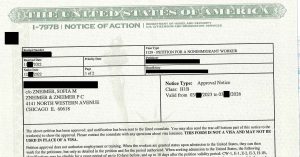If you are a potential H-1B worker who has not been selected for the H-1B lottery, you have other options. At Zneimer & Zneimer, our experienced immigration attorneys can help employers and workers who were not selected for the H-1B visa lottery to find the best path forward.
One option for H-1B workers who have not been selected in the lottery is to consider alternative visa options. There are several other visas that may be available, depending on your individual circumstances. For example, if you have an advanced degree, you may be eligible for an O-1 visa, which is designed for individuals with extraordinary ability in the arts, sciences, education, business, or athletics. Another option is to seek F-1 status as a student, or if you have OPT and are eligible for STEM OPT, you can seek extension of your STEM OPT. It is also possible to explore other work visa options, such as the L-1 visa, which is designed for intracompany transferees, or the E-2 visa, which is designed for individuals from treaty countries who invest in a U.S. business. If the company has overseas offices, a temporary work abroad may provide ability to obtain L-1A or L-1B visa next year. Some people may qualify for permanent residence through National Interest Waiver or as people of exceptional or extraordinary abilities.
If you have not been selected for the H-1B lottery, don’t give up hope. Contact Zneimer & Zneimer today for a consultation, and let our immigration attorneys help you find the best path forward. We are here to help you achieve your immigration goals and build a successful future in the United States.
 Chicago Immigration Lawyer Blog
Chicago Immigration Lawyer Blog


